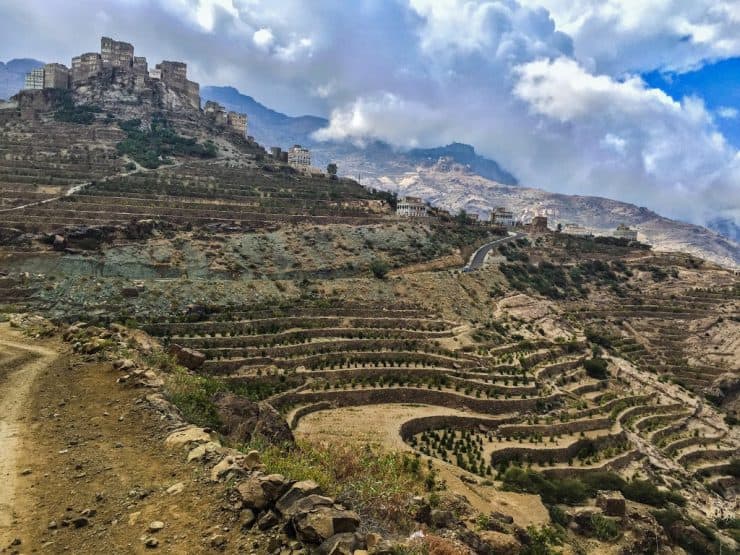Grown traditionally without chemicals (e.g., organic) in Yemen, Mocha is a wild, dry processed (natural) coffee, usually full-bodied with a rich, winey acidity. The dry processed and rather wild coffee with a full body, winey acidity and deep earthy tones. The musky fruitiness gives way to a wonderful chocolaty finish. This is a lively coffee with spice notes of cardamom and cinnamon as well as dry fruits such as raisins and pleasant sweet spice notes.

Yemen Coffee on a Mountainside - Sprudge
The flavor is often described as complex, very earthy and deep, and with a distinct pungency. Yemen Mocha may also exhibit a musky fruitiness, and a chocolaty aftertaste.
A Dark Roast brings out the hints of fruit and the rich notes of chocolate. Mocha coffee is typically either marketed as Mattari (known for its heavier body and chocolate notes) or Sanani (respected for its fruitiness and fine balance).
Indonesian Java Arabica coffee is blended with Yemen Mocha to create one of the world’s oldest and most traditional blends – the famed Mocha Java Coffee.
Yemen Mocha Coffees
Yemen Mocha coffee is described as lively, even a bit gamey. The pleasant wildness of Yemen Mocha has overlays of dry cinnamon, cardamom, and dry fruits (e.g., raisins) and occasional notes of tobacco, wood, roasted nuts, or sweet spice.
Rich chocolate tones and hints of fruit and wine are noticeable when the Mocha coffee beans are given a Dark Roast which also intensifies the taste and aroma as well as the coffee's body.
Yemen Mocha Coffee Farming
Mocha is grown in Yemen near the Red Sea in the mountainous region on the Arabian peninsula's southern tip—the coffee is named after the ancient port there.
Some of the finest Yemen Mocha is grown in northern Yemen just like it was a millennium ago on irrigated terraces on the region's semiarid mountains where the water is channeled to the plants in rock-lined channels and rows of poplar trees shade the plants from the heat of the desert sun.
Marketing Mocha Coffees
Mocha coffee is marked as either Mattari (which has chocolate overtones and a heavier body) or Sanani (which is more balanced and with a fruity character).
Mocha Sanani coffee is known for its complexity and exotic pungency, while Mattari coffee (which is sometimes blended with Yemen Mocha coffee), is distinguished for its winey acidity.
Mocha Java Coffee
Of course Mocha coffee is most famous for the blend it creates with Indonesian Java Arabica coffee. Mocha Java is a traditional favorite with an interesting story.
Mocha coffee is one of the first coffees to be cultivated on Earth, and continues today to be a coffee bean that is highly valued by specialty coffee lovers. Yemen Mocha is also referred to as Arabian Mocha coffee.
Yemen Mocha Coffee and Espresso Brewing Tips
For easy to follow instructions on how to make great Yemen Mocha espresso drinks see Espresso Drink Recipes and the How to make a Latte. Also provided are tips on Pulling A Perfect Espresso Shot.
Buy Mocha Coffee Beans
- ✔️ Fresh roasted to order
- ✔️ 100% high qualtiy Arabica coffee
- ✔️ Custom grind (or whole bean)
- ✔️ 1-way valve, laminate bag (for freshness)
- ✔️ Bulk discounts
Green Coffee Production
| Year | 60kg bags | Coffee grown |
| 2016 | 125,000 bags | 16,500,000 pounds |
| 2015 | 138,357 bags | 18,263,084 pounds |
| 2014 | 150,076 bags | 19,809,992 pounds |
| 2013 | 185,056 bags | 24,427,379 pounds |
| 2012 | 187,525 bags | 24,753,313 pounds |
Green Coffee Exports
| Year | 60kg bags | Coffee exported |
| 2016 | 0 | 0 pounds |
| 2015 | 8,360 | 1,103,520 pounds |
| 2014 | 20,080 | 2,650,560 pounds |
| 2013 | 55,060 | 7,267,920 pounds |
| 2012 | 57,530 | 7,593,960 pounds |
Data may not be available for the most recent year.
Source: ICO


Hassan
Hi
I like to be the coffee distributor Yemeni mocha matari coffee in south Africa. How do I do so ?
Derek
Where can I buy Yemen mocha coffee in Australia
John Sotomayor
Hello:
I would like to sell Yemeni Mokha Matari coffee,Med. in Puerto Rico. How can I do this ? Can I get the coffee in 12 or 14 ounce bags. What would be wholesale prices ? Do you have a representative in New York City or Florida ?
Thank you.
ADAM
Hi John, have you found a wholesale for Yemen coffee? if not, please let me know and I can help.